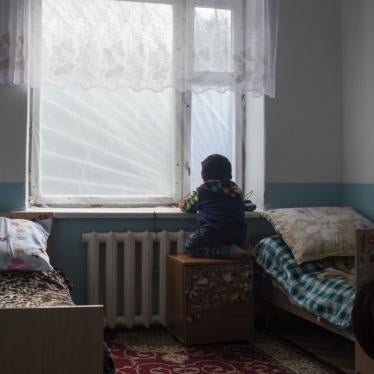April 10, 2012
Members of the United Nations
Committee on the Rights of Persons with Disabilities
Office of the United Nations High
Commissioner for Human Rights (OHCHR)
Palais Wilson
52 rue des Pâquis
CH-1201 Geneva, Switzerland
Re: Review of Hungary
Dear Committee Members:
We write in advance of the Committee on the Rights of Persons with Disabilities’ upcoming review of Hungary to highlight areas of concern that we hope will inform your consideration of the Hungarian government’s compliance with the Convention on the Rights of Persons with Disabilities (CRPD). This submission focuses on violations of the right of people with disabilities to political participation in Hungary that are inconsistent with Articles 3, 5, 12, and 29 of the Convention, and is based on ongoing monitoring of the human rights situation in Hungary.
In your upcoming Committee review of Hungary, Human Rights Watch urges you to question the government of Hungary about the Constitutional provision to exclude of persons with intellectual and mental disabilities from political participation. By highlighting this area of concern, which seriously undermines the rights of persons with disabilities, we hope to inform your consideration of Hungary’s implementation of the CRPD.
Exclusion of persons with intellectual and mental disabilities from political participation
The right to political participation is both fundamental to democracy and a fundamental human right. Article 12 of the CRPD ensures that all persons with disabilities may enjoy legal capacity on an equal basis as others in all aspects of life. Furthermore, Article 29 guarantees the right to participate in political and public life on an equal basis with others, directly or through freely chosen representatives. Yet the recent revision of the Hungary constitution deprives some persons with disabilities of their right to vote, and is incompatible with Hungary’s obligations under the Convention.
Hungary’s new constitution, the Fundamental Law of Hungary, went into effect on January 1, 2012, and includes provisions that could lead to discrimination against people with disabilities. While Article XV of the Constitution rightly states that everyone has legal capacity and that no one should be discriminated against on the basis of disability in exercising rights, Article XXIII(6) undermines this principle by stating that a judge can take away the right to vote from those with “limited mental capacity.”
Although this provision may be an improvement from previous Hungarian law, which summarily deprived individuals under guardianship of the right to vote, this provision still falls short of CRPD standards because it could lead to the denial of the right to vote for many people with intellectual or mental disabilities, solely based on their disability status. As such, this provision seriously undermines the principles of the CRPD, including non-discrimination, inclusion, equality and participation.
In November 2011, the Committee of Ministers of the Council of Europe adopted a recommendation which states that “[a]ll persons with disabilities, whether they have physical, sensory, or intellectual impairments, mental health problems, or chronic illnesses, have the right to vote on the same basis as other citizens, and should not be deprived of this right by any law limiting their legal capacity, by any judicial or other decision or by any other measure based on their disability, cognitive functioning or perceived capacity.”[1] The Recommendation called for European governments to “ensure that their legislation overall does not discriminate against persons with disabilities in political and public life.”[2] While not legally binding, all 47 member states, including Hungary, reached consensus on the Recommendation and thereby, Hungary acknowledged the legitimacy of its principles.
Furthermore, in December 2011, the Venice Commission, the Council of Europe's advisory body on constitutional matters, adopted a declaration which states that, “universal suffrage is a fundamental principle of the European Electoral Heritage. People with disabilities may not be discriminated against in this regard, in conformity with Article 29 of the CRPD and the caselaw of the European Court of Human Rights[3]”.[4]
All of these mechanisms definitively conclude that there should be no restrictions of the right to political participation on the grounds of disability.
In your upcoming review of Hungary, Human Rights Watch urges the Committee to question the government of Hungary about what steps it will take to amend the Constitutional provision on disenfranchisement in line with the CRPD.
We also urge you to ask the government about what measures it is taking to ensure that persons with mental and intellectual disabilities in particular are not denied their right to political participation and have the support and accessible information needed to exercise this right.
We hope you will find the comments in this letter useful and would welcome an opportunity to discuss them further with you. Thank you for your attention to our concerns, and with best wishes for a productive session.
Sincerely,
Lydia Gall Shantha Rau Barriga
Researcher Disability Rights Researcher/Advocate
Europe/Central Asia Division
[1] Council of Europe, Committee of Ministers. Recommendation CM/Rec(2011)14 of the Committee of Ministers to member states on the participation of persons with disabilities in political and public life. Adopted 16 November 2011 at the 1126th meeting of the Ministers’ Deputies, Retrieved from https://wcd.coe.int/ ViewDoc.jsp?Ref=CM/Rec(2011)14&Language=lanEnglish&Ver=original&Site=CM&
BackColorInternet=C3C3C3&BackColorIntranet=EDB021&BackColorLogged=F5D383.
[2]Ibid.
[3]European Court of Human Rights, case of Kiss v. Hungary, application No. 38832/06, judgment 20 May 2010. See in particular par. 43-44, with a reference to Article 29 of the UN Convention.
[4]Venice Commission (European Commission for Democracy through Law). Draft revised Interpretative declaration on the Electoral rights of people with disabilities. CDL(2011)041rev. Adopted 17 December 2011, Retrieved from http://www.venice.coe.int/DOCS/2011/CDL-OJ(2011)004ANN-E.ASP?PrintVersion=True








